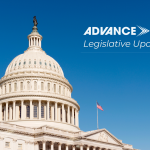This week both the House and Senate considered and advanced several pieces of legislation with implications for the Career Technical Education (CTE) community. Elsewhere the U.S. Department of Labor (DOL) published proposed regulations that would overhaul the existing framework for registered apprenticeship programs and significantly expand the scope of these rules in relation to CTE programs funded by the Carl D. Perkins Career and Technical Education Act (Perkins V).
House Education and Workforce Committee Advances WIOA Reauthorization
 This week the House Education and Workforce (E&W) Committee marked up and advanced H.R. 6655, A Stronger Workforce for America Act (ASWA). The legislation would reauthorize the Workforce Innovation and Opportunity Act (WIOA), which was last updated in 2014. Notably for the CTE community, the legislation proposes significant changes to youth funding authorized by the legislation, including changes to the underlying definition for eligible youth populations that would allow for greater coordination and alignment with CTE programs. ASWA would also encourage greater local alignment of CTE programs of study and career pathways programs. The legislation would also codify the Workforce Data Quality Initiative and the Strengthening Community College Workforce Development Grant program– two key Advance CTE WIOA priorities– along with a host of other proposed changes to current law. However, Advance CTE is still analyzing additional elements of the legislation that were less encouraging and plans to issue a more comprehensive response regarding the legislation shortly.
This week the House Education and Workforce (E&W) Committee marked up and advanced H.R. 6655, A Stronger Workforce for America Act (ASWA). The legislation would reauthorize the Workforce Innovation and Opportunity Act (WIOA), which was last updated in 2014. Notably for the CTE community, the legislation proposes significant changes to youth funding authorized by the legislation, including changes to the underlying definition for eligible youth populations that would allow for greater coordination and alignment with CTE programs. ASWA would also encourage greater local alignment of CTE programs of study and career pathways programs. The legislation would also codify the Workforce Data Quality Initiative and the Strengthening Community College Workforce Development Grant program– two key Advance CTE WIOA priorities– along with a host of other proposed changes to current law. However, Advance CTE is still analyzing additional elements of the legislation that were less encouraging and plans to issue a more comprehensive response regarding the legislation shortly.
The bipartisan legislation was advanced out of the E&W Committee on Tuesday by a margin of 44-1. The proposal is expected to be further considered by the full House of Representatives sometime next year when Congress returns from its holiday recess.
House Leaders Markup New Workforce Pell Proposal
As shared previously, Reps. Stefanik (R-NY) and DeSaulnier (D-CA), along with House Education and Workforce Committee Chair Foxx (R-NC) and Ranking Member Scott (D-VA), recently introduced H.R. 6586, the Bipartisan Workforce Pell Act (BWPA) last week. The bipartisan legislation is a compromise between previously introduced legislation sponsored by the E&W Committee Chair and Ranking Member earlier this Congress. The expansion of Pell eligibility for high-quality, shorter-term CTE programs has been a longtime priority of Advance CTE.
Notably, the legislation was amended during markup in several ways, including a new provision requiring coordination with state Perkins eligible agencies in determining programmatic alignment to high-skill, high-wage or in-demand occupations and sectors. The BWPA also contains a slew of new eligibility criteria that would be overseen and implemented by the U.S. Department of Education (ED), state workforce development boards and higher education accreditation agencies. Advance CTE and the Association for Career Technical Education issued a letter in response to the BWPA shortly after its passage out of the E&W Committee on a margin of 37-8. Advance CTE is encouraged by this latest development and looks forward to working with Congress as this issue moves forward in the legislative process.
HELP Committee Clears Bipartisan Education Sciences Reform Act Reauthorization
Last week, the Senate Health, Education, Labor and Pensions (HELP) Committee formally introduced the Advancing Research in Education Act (AREA) — bipartisan legislation that would reauthorize and update the Education Sciences Reform Act (ESRA). This legislation makes important updates to ESRA, including significant reforms to the State Longitudinal Data System Grant program and broader education research and technical assistance functions overseen by the ED. As shared previously, Advance CTE has strongly supported many of the core components of AREA, particularly provisions that complement and relate to CTE, and has formally supported the legislation ahead of a scheduled markup this past Tuesday. The HELP Committee subsequently advanced this proposal on an overwhelmingly bipartisan basis, 20-1. AREA now moves to the full Senate for further consideration by the upper chamber.
DOL Proposes Major Changes to Apprenticeship Regulations With CTE Implications
Yesterday, the U.S. Department of Labor (DOL) published a notice of proposed rulemaking (NPRM) that proposes significant and wide-ranging changes to the regulatory framework for registered apprenticeship programs. Of note for the CTE community, the NPRM suggests a significant expansion of the regulatory requirements related to a new program model DOL is currently referencing as “CTE Apprenticeships.” The NPRM includes a number of other new regulatory requirements that would relate to CTE programs funded by Perkins V. Advance CTE is in the process of analyzing this proposal and will have more to share on this NPRM soon. A 60-day comment period will begin when the draft proposal is formally published to the Federal Register. In addition, DOL has scheduled a webinar in early January to provide an overview of the NPRM.
Steve Voytek, Policy Advisor

